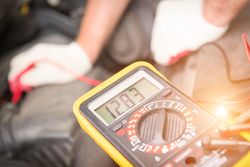Why Is Your Alternator Overcharging the Battery?

Alternators are an essential component of most moving vehicles, including trucks, tractors, and forklifts. They are responsible for turning the mechanical movement of the engine into an electrical current to keep the battery charged. However, sometimes they can do their job too well, which will kill your battery. The guide below explains possible causes for this issue and ways to recognize the signs.
Why It Happens
Alternators have either an external or internal voltage regulator, which controls the amount of electricity that the alternator produces depending on the speed the vehicle is going, using electromagnetic contact switches. If one of those switches gets stuck, the alternator will begin overcharging. This issue can also be caused by an electric surge through the battery—for example, when trying to jumpstart your vehicle. This, in turn, disrupts the wiring in the alternator.
How to Recognize Overcharging
 When the battery is overcharged, the fluid in it will start to burn off due to overheating. You may notice an acidic smell when the engine is on. If you look at the battery itself, the case may start to swell up or fluid may start to leak out. Check the voltage when the engine is running. Depending on the type of battery, it should measure 12, 24, 36, or 48 volts. Anything three or more volts over this is a cause for concern.
When the battery is overcharged, the fluid in it will start to burn off due to overheating. You may notice an acidic smell when the engine is on. If you look at the battery itself, the case may start to swell up or fluid may start to leak out. Check the voltage when the engine is running. Depending on the type of battery, it should measure 12, 24, 36, or 48 volts. Anything three or more volts over this is a cause for concern.
Turn to the team at Eubanks Auto Electric in De Kalb, TX, when you need an expert for alternator or starter assistance. Since opening in 1954, they have specialized in starters and alternators for all types of vehicles including industrial equipment, heavy-duty vehicles, forklifts, and tractors, handling many of the repairs in just one day. If it needs replacement altogether, they can exchange it for the right one from their expansive inventory. Contact them at (903) 667-2081 to request a free estimate. Or visit them online for more on their services.
About the Business
Have a question? Ask the experts!
Send your question

